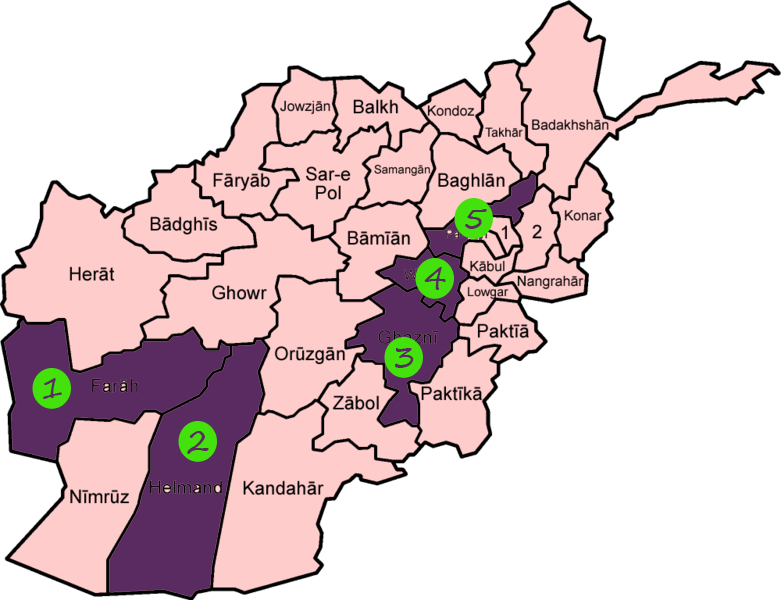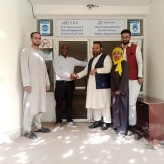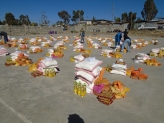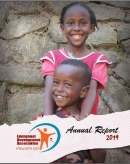A. Operation Areas and Population size per Province
In Afghanistan, 47.3% of the population lives below the national poverty line in 2020. The main challenges of Afghan women’s small and medium enterprises are Lack of financial resources and support, non-availability of specific markets and platforms for business development, high bureaucracy in government procedures, and documentation for business registration and taxation. Besides, social and environmental barriers always exist due to lack of education and family support as well as gender discrimination. Similarly, factors such as political, economic, and instability is can have an adverse effect on business development in the country. All the above province economy depends on agriculture. These provinces have minerals such as gypsum, lime and construction stones, uranium ore, and copper. Of the total population, 74% of people in the Rural depend on crop harvesting and livestock (AHF, 2020).
B. Current challenges of the community in terms of Sector
1. Health
According to (AHF 2022) report, 25 percent of the population of Afghanistan does not have access to primary healthcare services. Caseloads in flood-prone areas during spring and summer are expected to further strain existing facilities. Hospitals and other healthcare facilities require immediate support and are at risk of closure. Referral facilities also need urgent improvement in the challenges the community currently is facing.
2. WASH
Accordingto (AHF 2022) data, due to the 2020/2021 drought, the recharge of aquifers has been significantly reduced. This has affected the quantity and quality of water available for drinking and domestic use, contributing to acute watery diarrhea (AWD) outbreaks, with cholera cases reported. The 2022 spring period is expected to see drought conditions continue in water-scarce areas, notably in rural areas where pastoralists rely on surface water and in locations with high groundwater salinity levels. The inability to access safe and clean drinking water, adequate sanitation, and hygiene will deepen vulnerabilities, especially from spring until summer – the highest-risk periods for AWD. Cyclical AWD, cholera, and other communicable disease outbreaks are anticipated during and after the flood season, with an increased risk of cholera among vulnerable populations in urban settings and rural, water-scarce areas.
3. Education sector
According to AHF (2022) report, Economic collapse, lower income, and higher costs have seen families increasingly resort to negative coping strategies which deprioritize education, including child labor, early marriage, and other forms of exploitation and abuse. The protracted crisis and a lack of resources has negatively affected children currently enrolled in community-based education (CBE) or accelerated learning programmes and limited the admission of new students. Lack of teachers, particularly women teachers, is chronic. Following the completion of the Taliban takeover, girls’ education prospects are extremely compromised, as most adolescent girls are not (at time of writing) allowed to attend school.
4. Food insecurity and nutrition
According to the latest report by AHF on 26 April 2022, the combined impact of an acute drought – the worst in nearly three decades – and the near-collapse of the economy in 2021 has generated a malnutrition crisis of unprecedented levels in Afghanistan, with some 22.8 million people projected to be facing acute food insecurity. As per the latest available forecasts, a weak to moderate La Niña event has been affecting Afghanistan since October 2021 and will likely continue from May 2022 until the wet season. Currently, most of the people are under emergency assistance, have high food prices, and have high unemployment.
Malnutrition is a top cause of death in children under age 5, contributing to 45 percent of deaths among children under age 5; it is estimated that a child with acute malnutrition is 3 to 12 times more likely to die than a well-nourished child, depending on severity. An estimated 4.7 million people are expected to suffer from acute malnutrition in 2022, including more than 1 million children with severe acute malnutrition, over 2.8 million children with moderate acute malnutrition, and over 800,000 pregnant and lactating women (PLW) with acute malnutrition –an increase of 21 percent from 2021.
C.Programatic Interventions
Considering the above critical challenges of the community EDA Afghanistan is engaging and going to execute those 4 thematic areas considering the most vulnerable community members, including women, youth, girls, children, people with disabilities, IDPs, returnees, and refugees from the other nearby countries.
• WASH
• Education
• Livelihood and Food Security
• Health and Nutrition
Child protection, disability, gender, and environmental protection would be mainstreamed and implemented as crosscutting thematic areas in those sectors mentioned above.
D.EDA Afghan Office
EDA Afghanistan
Afghanistan, Kabul, Qala-e-Fatullah
street #5, House # 34
Mobile: +930784883030
Office cellphone: +93 (020)2212348
Email: This email address is being protected from spambots. You need JavaScript enabled to view it.

















